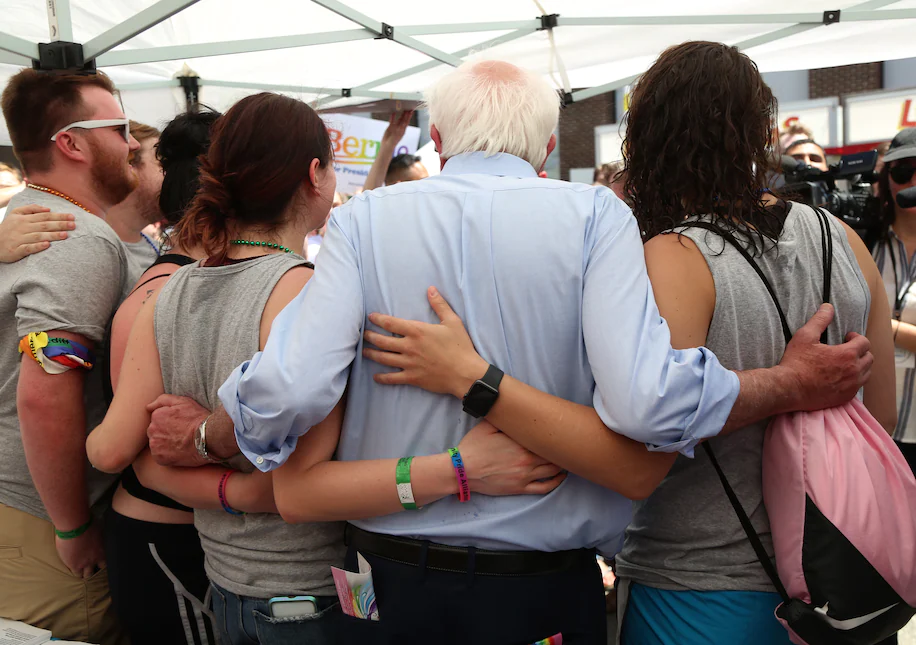
By Michelle Ye Hee Lee
Sen. Bernie Sanders’s campaign has received 4 million individual donations from people across the country, reaching the milestone months earlier than he did during his 2016 presidential run, his campaign said.
About one-quarter of donations so far came from online supporters signed up to automatically give money monthly, officials said. More than 175,000 people have signed up to donate a set amount each month, similar to a monthly subscription service.
Candidates are increasingly using this subscription model to cultivate a low-dollar donor base. They bring a measure of predictability to online donations, which tend to be driven by buzz around a viral moment or a big marketing push.
But candidates such as Sanders (I-Vt.) and President Trump, both of whom have a loyal base of online donors, have shown that building a successful recurring program can give them an edge they can rely on as a guaranteed source of campaign cash.
“The support from these recurring donors means we aren’t prone to wild highs and lows in small-dollar fundraising. It’s a consistent, growing source of donations we can count on, which makes it easier for us to plan,” said Tim Tagaris, a senior adviser to the Sanders campaign and an architect of his 2016 digital fundraising juggernaut.
Sanders’s campaign said that during the 2016 primaries, it did not reach 4 million donations until after the New Hampshire vote in early February.
[Fueled by army of low-dollar donors, Sanders posts largest third-quarter haul]
It is difficult to compare Sanders’s donation count to prior presidential campaigns, because few candidates before him kept public track of such a measure. Federal records of Sanders’s donors will be made public Jan. 31.
The predictability of recurring donations helps campaigns’ and organizations’ small-dollar programs, because it allows groups to reserve more ads, lock in better advertising rates early and possibly add campaign staff, said Cheryl Hori, who runs the San Francisco-based Democratic digital strategy firm Pacific Campaign House.
“For a presidential campaign, that means being able to look ahead to vulnerable states and say, ‘We know we have X dollars hitting the bank account in recurring donations between now and Super Tuesday, let’s reorganize our spending and plan accordingly,’” Hori said.
But there have been some issues with recurring donations, such as instances in which campaigns have received emails or letters from families saying that they are pulling $25 from the bank account of a relative who is deceased, Hori said.
Online tools such as ActBlue, the Democratic fundraising platform, have made it easy for campaigns to launch recurring donor programs.
And the trend is growing. In the third quarter of 2019, more than $49 million in donations processed on ActBlue came in through recurring contributions, nearly double the $25 million in the third quarter of 2017, according to the platform.
So far in 2019, more than $100 million in donations were processed on ActBlue in recurring contributions, it said.
[Democrats, anxious over Trump’s money advantage, launch swing-state spending efforts]
Leela De Paula, an 18-year-old student at Smith College in Northampton, Mass., became a monthly Sanders donor about five months ago.
“I find him to be the most feminist candidate, and that’s really important to me, because I feel that just having a woman as a candidate is not enough,” De Paula said, adding that she likes Sanders’s stances on climate change and poverty. “I’m a monthly [donor], and I buy his merch. I can’t afford as much, so I give $10 a month.”
Gail Szafir, 58, a seasonal worker from Troy, N.H., and her partner each give $5 monthly donations to Sanders to show their strong support for his campaign. Szafir spoke while waiting in line for a Sanders rally in Keene, N.H., with a Sanders figurine in hand.
“I’ve been doing small donations. We’re not in a great money position right now,” Szafir said. She says she gives a little extra when her donations count the most: “Right before he gets on for a debate, bam. Right when he got out of the hospital that day [after his heart surgery] — those are the most important times.”